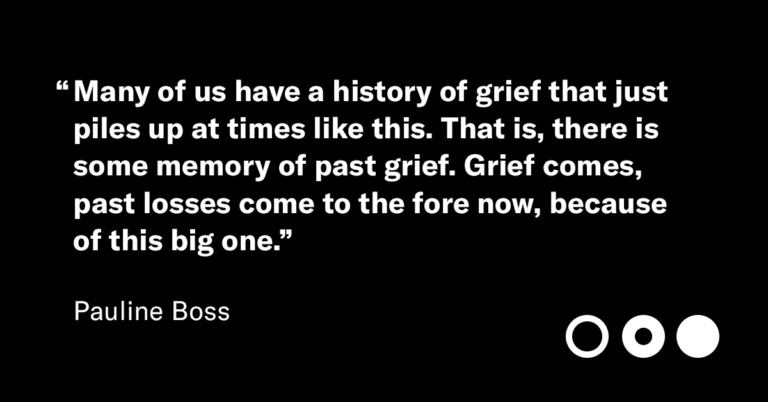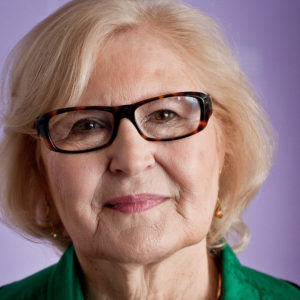Living the Questions
It’s really settling in now, the losses large and small
Simple ways to understand our emotions, and treat ourselves kindly, amidst pandemic realities, and why loss without closure is so stressful — these are themes touched on in this personal “Living the Questions” conversation between Krista and Pauline Boss. She created the field of “ambiguous loss” within psychology and family therapy. This is a companion conversation to our longer On Being conversation with Pauline: Navigating Loss without Closure.

Guests

Pauline Boss is professor emeritus at the University of Minnesota. She is the author of Ambiguous Loss: Learning to Live with Unresolved Grief, Loving Someone Who Has Dementia, and Loss, Trauma and Resilience.

Krista Tippett created and leads The On Being Project and hosts the On Being radio show and podcast. She’s a National Humanities Medalist, and The New York Times bestselling author of Becoming Wise: An Inquiry into the Mystery and Art of Living. Read her full bio here.
Transcript
This transcript has been lightly edited for readability.
Krista Tippett, host: So I have not prepared my questions. I just want to settle in to talk with you for 20, 30 minutes. And we are putting out the show that we did a few years ago, which really lays out the notion of ambiguous loss, the myth of closure. But I want to just reflect on with you this morning, very directly, on — what does ambiguous loss mean in a global pandemic?
Pauline Boss: Well, it means, essentially, the same thing that it meant on the individual and family level. But suddenly it has this global meaning, which I never intended until the phone started ringing, so to speak. The emails came in with the pandemic, saying, isn’t this ambiguous loss? So as a theoretician, I was delighted that people, journalists and ordinary people, put it together. That’s a dream that an academic wants, that whatever you do is useful to the general public. But then I began thinking, of course, it’s ambiguous loss — but it’s more abstract. And it’s beyond the individual or family, now. It has been raised to a higher level, to help us make sense of this nonsensical thing that’s going on, this invisible enemy.
Tippett: So we’re going through a global, civilizational moment of ambiguous loss at a societal level.
Boss: Yes. We have lost. Indeed, we have lost our freedom to go about our day as we always have. We have lost our freedom to visit with our loved ones or to have lunch with dear friends. And, I must say again, because the school thing is coming up, the young people have lost, not only a year, it may be two years, of what they usually do: go to school in the usual manner; make friends; socialize; learn; learn. And that generation will have to carry that the rest of their lives.
Tippett: I’m finding, personally, and picking up in others — obviously, this is not a scientific study I’ve done — but it feels to me, in myself and in others, that I’ve hit this moment. I don’t know how many months we are on now, from March …
Boss: Too many.
Tippett: Yes, certainly. But certainly, in March and April and May, there was a sense that this will end; that this is something we have to do so that we can get through this. And even things that got cancelled got rescheduled for, first, July, and then September, October. And I feel like it’s really settling in now, the losses. And they’re large and small, as you say. People have lost loved ones. But there’s also this loss of going to the office; of certainty, like that your kids will go to school. My son didn’t really graduate from college. Some of these things, people will bounce back from. I actually really trust that our kids — who knows how this will affect them? It might be just transformative in generative ways that we can’t imagine. And yet, there are all these losses, large and small, all at once. And we’re carrying them individually, but we’re also carrying them at the same time. And it’s happening to you, too, personally.
Boss: It is. It is. As you know, I’m a caregiver for my husband. Although I have help, which is why I’m talking with you right now. And that went quite well, because I could get rested by going out for lunch with friends or going for a walk —
Tippett: You mean, before the pandemic. You were already caregiving.
Boss: Before the pandemic. And then the pandemic hit. And caregivers are finding that they don’t have the freedom they had to take a break. You’re stuck inside, and that makes it doubly stressful, I think, for caregivers, including myself.
Tippett: So I’ve heard you say that it’s one thing to write the book about this, about ambiguous loss, and another thing to go through it yourself. And I wonder what you might share, or what you might offer, about how you have been wrestling with that and what there is in this — I would say, ambiguous loss is a description of a human experience that hadn’t quite been described before. You didn’t invent the experience, you invented the language.
Boss: Named it.
Tippett: You named it.
Tippett: And so here we are, with this magnitude of — as you say, it’s been completely taken out of the individual level, or even, sometimes, it would happen to distinct communities. So what do you know from being in this field — from being the person who named this, too — that’s helping you walk through these days, that you might offer up to other people about walking through these days, these months, and these years ahead?
Boss: I think I’m in it with everybody else, struggling.
And I suspect I’ve spent 40 years studying ambiguous loss because I don’t like ambiguity. I remember when I first went to the University of Wisconsin in Madison, in one class or another, we were describing each other. And somebody called me decisive. And I took that as a high compliment. [laughs] I don’t, anymore. I’ve come to believe in both/and thinking, which I write about. I don’t like binary thinking, unless you’re working with your banker or someone like that. There’s a middle ground, a middle way to go, when you’re dealing with people and when you’re dealing with problems. We have huge problems right now. And to say that someone was wrong when the pandemic began, about what they thought about it — a scientist — and now they think differently, that’s binary thinking. And I can’t take it anymore.
And certainly, with science in my background, we never land on “this is the absolute truth, and nothing else will ever change it.” We never go there. And I don’t think the public understands that, that science is a process of finding the approximation of truth, and then somebody else will come along and perhaps improve upon it. That’s how it goes. And it’s not like you win or you lose. It’s not that way.
So I’ve struggled with that myself, and I think I’m at a place — gradually, working with the people who are suffering from ambiguous loss all these years — I’ve learned from them that you can live with it. You can, eventually, not embrace it and maybe not even accept it, but you can decide to live with it. You can decide to accept it. “Decide” is the main word there. And then you can live well, nevertheless.
Tippett: “Decide,” because that would be …
Boss: Your choice.
Tippett: … your agency, asserting itself.
Boss: That’s right. So you’re not totally helpless.
I think none of us should feel helpless. And we do now, in many ways. So we have to decide how to cope with it, have some things you can control, because you certainly can’t control the virus, yet.
Tippett: Is that an important tool — to understand what you do have control over?
Boss: Yes. [laughs]
Tippett: Even if it’s really modest?
Boss: Yes. And that’s why everybody’s baking bread or cleaning a cupboard, whatever, and maybe doing more physical exercise. Those are good things, because you can control that. And you have to have that, because we’re going to have a year of not being in control of the virus, so you’ve got to have something you’re in control over. I love to see that so many people are cooking and baking. [laughs] I think that’s just lovely.
Tippett: And I like, actually, what you’re pointing out, that it’s taking charge of something that has a beginning, a middle, and an ending, and it even has a pleasurable ending. [laughs]
Boss: Yes, cooking does, or baking. And in fact, so does cleaning, so does building up your body in a better way or learning a new language or whatever you’re doing. It’s something you chose, and it does have a beginning, a middle, and an end, as you say. And that’ll help you to feel less helpless during this unfortunate time.
Tippett: I want to just ask you, really specifically. I find — and again, I don’t want to universalize my experience, but I hear other people talking this way — that I have good days and bad days. And I have days that start good, and then I just fall into these holes of just feeling so disoriented and despairing. I think one way for me to analyze those times, also, is just the feeling of so much — like I have nothing to hold onto, which is an experience of loss, even if it’s really ordinary things. How might I counsel myself in those waves?
Boss: To be transparent, I would say I have exactly the same waves. [laughs] And what I was telling myself, the other day, is: I’m grieving. You don’t think you’re grieving. In my case, fortunately, someone in my family did have COVID, but no one died. So it must be awful for those families where someone died, and perhaps they couldn’t be with them, or they couldn’t have the rituals that they usually have, to comfort them afterwards. But the rest of us — because this has gone on so long, I think there are days when you should just let yourself feel sad. And be easy on yourself on those days.
I remember, one day, I thought, “I think I should do nothing but watch Netflix, today.”
Tippett: And that’s OK?
Boss: And it’s OK. I watched an old Ingmar Bergman movie, which is funny, because they’re always sad. [laughs] But it was The Emigrants. [Editor’s note: The Emigrants was directed by Jan Troell, not Ingmar Bergman as stated here.] And that took up three hours, but it was so beautiful to look at that I, for one thing, felt better afterwards. So maybe it’s like embracing your sadness for a few hours and for that day. I don’t think we should fight grieving. I think we have a lot to grieve right now. It’s reality. And so, on those days when you feel that way, I would just embrace it if you can, and go easy on yourself. Now, I understand, people with small children, and caregivers, and so on, may not be able to do that.
Tippett: But I think, mentally, even making a mental note — even if you have to keep doing things — that you’re grieving and that you’re not fighting that reality … Would you say a little bit just about how grief works on us? One thing I know about grief, and sometimes it helps me, on these days when I feel overwhelmed and despairing — because I also feel so tired. And then I say, oh, yeah — grief is exhausting. Somehow, just naming that fact, I find helpful, because at least some part of me stops beating up another part of me for being exhausted for no reason.
Boss: That’s right. Oh, we have a good reason. [laughs] We have a worldwide pandemic, and it’s cutting in on everything that we have done before. So even the big losses, the little losses, pile up after a while, and you feel sad. Now, the most important thing to remember is that grief is normal if you’ve lost something. And I would wager that everyone could make a list of what they’ve lost during this pandemic — the loss of whatever it is you did before. Grief, often, is not recognized, because it’s not a very popular topic in this country. Because we like winning, not losing. And unfortunately, sometimes, we can’t win at the moment we want to, so then we feel like grieving. We feel sad.
But we rarely identify it as that, because grief has been pathologized. And because of that, people are afraid to say, “I feel I’m grieving, today,” because that means you’re mentally ill. You have a disorder, a grief disorder. In my writings, I make a strong statement that for most people, grief is normal. For a minority, for the minority, the lower percent, maybe a quarter of people, grief may require seeing a psychiatrist or psychologist or therapist, especially if you have this one other quality about grief, and that is that you hate yourself; that your self image is gone, and you may feel suicidal. Then, those people need to reach out for help. And we need to help them reach out for professional help. But the vast majority of people can cope with sadness by human companionship, by self-soothing, by exercise, and in ordinary times, I would say, seek out social connections. And now we have to do that virtually.
Tippett: That’s hard now. That one’s hard now.
Boss: That’s very hard. That’s taken away from us right now, and so we have to use the other coping mechanisms.
But be easier on yourselves and normalize it. Know that grief — those feelings you described — are essentially normal. So just take the day off, or do something easy on yourself. Treat yourself.
I was so bad, one day, [laughs] I decided, I need to have this hot water I’m now having — instead of coffee, for medical reasons — I’m just going to have it in the best china cup in my cupboard. [laughs]
Tippett: Right; I love that.
Boss: It was so silly. But it made me feel better.
Tippett: I like that. I also wonder. I hear you about how grief has been pathologized, but I think the other dynamic now might be that somebody might look around and say, there are people who have lost their loved ones and not been able to mourn and have that passage of death. And so how could I claim what I’m feeling as grief?
Boss: Oh, the big and the little. I’ve learned the hard way not to judge grief anymore, about who’s hurting the most. You get yourself into real trouble if you go that direction. And mostly, we shouldn’t do it for ourselves, either. For one thing, many of us have a history of grief that just piles up at times like this. That is, there is some memory of past grief. Grief comes, past losses comes to the fore now, because of this big one.
Do you remember when President Kennedy was shot? The nation was in tears. And most people did not know him personally. They knew him as the president, of course. But it triggered past unresolved griefs, and maybe not unresolved. I’m thinking of all the losses in my life now — I think of these people more during this period. I thought that was funny, and then I realized, no, I think it’s normal.
Tippett: That’s so interesting to think about, such an important piece of realization.
Boss: I think a good exercise is, when you feel sad, is to make a list of all your losses from the first time you can remember. And most people will find out, it’s quite a pile.
Tippett: [laughs] Right. What is the most skillful, reality-based way of being helpful to others right now?
Boss: It’s hard to say, because one is constricted. But I’m not a Luddite. I’ve learned to use technology pretty well. And I find that that’s a saving grace at this period of time, the internet, the Zooms, the FaceTimes. If it weren’t for that, I don’t know — it would be much worse, I think. So that’s one thing: stay in touch with friends, with family, in the ways that you can. Have your rituals. Rituals are very important, by the way. I have gone to a funeral-memorial service on Zoom, and it was extremely moving. And there are weddings that are being done in different ways, and graduations. We have to have our rituals, and we have to help each other do that, because without the rituals, we’re going to lose meaning in the events of our lives, the good ones and the bad ones.
And so some of us, some people are not so big on birthday parties and this kind of thing, and those of us who are, that’s one way of helping. And there’s small things: put a plate of cookies in front of someone’s door. People have done that for me. They go to the farmers market, because I can’t, and so they put some carrots on my door. Those are kindnesses that will help us get through all this. We have to keep in touch with one another, because we’re social beings, in ways that we can.
Tippett: Even if the forms feel inadequate and frustrating in their own way.
Boss: Exactly.
Tippett: I think that’s what I hear you saying.
Boss: Exactly.
Tippett: I was already — I have been, for a long time — completely frustrated with this thing Americans do, which is, “How are you? How are you?” as the first question, and it’s not really a question, it’s just like a verbal tic. And in these last few months, I have been known, once or twice, to bite somebody’s head off [laughs] for asking me that, especially in the weeks after George Floyd was killed. I would be on the phone with somebody from someplace else, and they’d say, “How are you?” and I would just give them a long, honest answer. “Well, actually, I’m in Minneapolis, and these are heavy, heavy, painful days.”
Boss: They were.
Tippett: I’ve been trying to find, for myself — because I have that impulse, too, it is the first thing that comes out of our mouth — I’m trying to find another question that is more respectful of the moment, like, “How is your heart?” That doesn’t always work. I don’t know. Have you thought about this? What are some ways we could approach each other, because “how are you” is the ritual of beginning a conversation. It’s an empty ritual. Do you have a thought about this?
Boss: I like this as an opener: “It’s nice to see you,” [laughs] because we’re not seeing anybody. By the way, even if it’s on Zoom or something, FaceTime, I say that. And of course, I say, “How are you?” It’s just a habit we all have. I think the question isn’t so bad. What makes it empty is, people don’t listen. They don’t really want the answer, and so they’re not patient enough to listen to the answer. That’s what we have to change. We have to listen to the answer.
I asked that of a friend, and she wasn’t well. She had major surgery that I didn’t know about. So what can you do? You have to listen and empathize. By the way, speaking of empathy: if nothing else, I hope this population in this country has grown more empathy than we had before, for one another, because we were so busy flying by each other, doing our thing. And now I hope we notice each other more; that we become more community-oriented and not just so individual-oriented, which makes those kinds of questions empty.
Tippett: I like that. I think, if we’re asking that question in a different spirit, that will somehow find expression at a physical level. Like if I ask you, “How are you?” and I really mean it, and I really want to hear the true answer, that itself starts to shift what that means.
Boss: I agree. And it takes more time.
Tippett: Takes more time. But I think conversations have to be more real now: “I really love you.” And say why, periodically: “I love the way you do this, or that,” so that these are words that will give more strength and more resilience to the others.
Hopefully people say that to you, as well. But those of us who’ve been around for a while, we’ve survived quite a few things. [laughs] So my first traumatic event was World War II. And I remember being afraid a lot — mostly afraid because of seeing my parents’ faces be afraid. So we’ll get through this, but we have to be kind to each other during this period.
Tippett: Thank you, Pauline. I’m so grateful for your work and that you’re in the world.
Boss: My pleasure, Krista.
Tippett: Bye-bye.
Boss: Bye.

Reflections